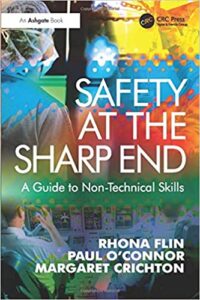Business leaders have long ago identified the connection of people’s behavior with safety in risky environments, making the human element a major area of study for improving overall safety performance of an organization. But how is the impact of this behavior translated into everyday working environment?
A book, entitled ‘Safety at the Sharp End: A Guide to Non-Technical Skills’ comes to act as a guide to the theory and practice of non-technical skills, also known as “soft skills”, for safety. Looking at the individual and the team as a whole, at the same time, the book discusses a number of different techniques used to identify non-technical skills and provides guidance on developing training designed to improve the non-technical skills of individuals working in risky environments.
 Written by three psychology experts, including Rhona Flin, Emeritus Professor of Applied Psychology in the School of Psychology at the University of Aberdeen, Paul O’Connor, Human Factors Psychologist, and Margaret Crichton, founder of People Factor Consultants Ltd., ‘Safety at the Sharp End’ takes leverage from an impressive list of academic references to present an overview of how to evaluate non-technical skills through the use of ratings of observed work behaviour and eventually, to describe how organizations can be effective at the “sharp end”.
Written by three psychology experts, including Rhona Flin, Emeritus Professor of Applied Psychology in the School of Psychology at the University of Aberdeen, Paul O’Connor, Human Factors Psychologist, and Margaret Crichton, founder of People Factor Consultants Ltd., ‘Safety at the Sharp End’ takes leverage from an impressive list of academic references to present an overview of how to evaluate non-technical skills through the use of ratings of observed work behaviour and eventually, to describe how organizations can be effective at the “sharp end”.
Taking real-world cases from ‘challenging’ industries, such as aviation and offshore sectors, the authors discuss all the important soft skills needed in high-risk organizations: From situational awareness to decision making and leadership, and from teamwork and communication to managing stress, as well as coping with fatigue, the book is covering a wide range of theoretically complex subjects in a uniquely accessible writing style, in order to improve safety in any field.
Acting as a must-read for human factors training, ‘Safety at the Sharp End’ is ideally addressed at individuals who are studying or training soft skills on Crew Resource Management and other safety or human factors courses, as well as at those researching industrial safety programmes or simply at anyone interested in human factors.
The behaviours that are protective for safety in higher-risk work settings (non-technical skills) are very similar across different cultures and work settings. We wrote this book to provide a general guide on the underlying science, with key information on how to identify, train and evaluate these important skills,
…Professor Flin told SAFETY4SEA.

































































